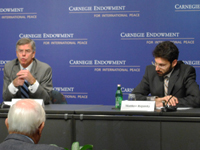Registration
You will receive an email confirming your registration.
IMGXYZ2823IMGZYXDespite his short tenure in office, President Viktor Yanukovich has already significantly shifted the course of Ukraine’s political and economic development by consolidating presidential powers, advancing an economic reform agenda, and revising the balance of Ukraine’s relationships with Russia and the West. Carnegie hosted a three-way video conference with former U.S. Ambassador to Ukraine William Taylor in Washington, Carnegie’s Olga Shumylo-Tapiola in Brussels, and Professor Sergiy Galaka of the Taras Shevchenko National University in Kyiv to discuss recent trends and prospects in Ukraine’s domestic and foreign policy. Professor Oleksandr Zadorozhnii of the Taras Shevchenko National University and Carnegie’s Matthew Rojansky moderated the event.
Problems and Opportunities from Within
After five years of instability since the Orange Revolution, Ukraine is embarking on a series of critical reforms aimed at changing the country’s political and economic landscape. This process presents Ukraine with a number of challenges and opportunities, Galaka said.
- Operational difficulties: As Yanukovich’s administration seeks to carry out its reforms, it is running up against a number of obstacles in implementing them effectively, argued Zadorozhnii. These include resolving several issues—such as the establishment of the visa-free regime and a free-trade zone, —to lay the groundwork for further negotiations on economic integration with Europe. Notwithstanding these operational hurdles, the participants all expressed hope that Yanukovich’s administration could sustain the momentum for change.
- Structural difficulties: Yanukovich and the Verkhovna Rada frequently clash on the subject of economic reforms, often leading to structural gridlock that was felt acutely in the recent dispute over the revision of the business tax code. Such disagreements—stemming from both constitutional constraints and personality conflicts—hamper the effective implementation of the reform agenda, argued Taylor.
- Challenge for democracy: The democratic situation in the country remains grim, thanks to the government’s weak commitment to institution-building and popular skepticism about the ability of the democratic regime to ensure political and economic stability, argued Shumylo-Tapiola.
- Potential political momentum: The ruling party’s victory in the October local elections bolstered Yanukovich’s position. Support from both the parliamentary majority and the population creates a unique opportunity for the government to deliver on its promises of reform and integration, argued Zadorozhnii.
A View from the West
- European expectations: While standing firm on its policy of military nonalignment with great powers or blocs, Ukraine seeks integration with Europe in economic and technological areas, stated Galaka. Long-awaited fast-track economic reforms—preceded by five years of political bargaining and economic stagnation during Victor Yushchenko’s term—have been greeted optimistically by the West. Nevertheless, the participants argued that economic reforms alone cannot win Europe’s trust in the long run. To do this, Ukraine must enhance the rule of law, protect democratic liberties, and provide greater media freedom and government transparency, explained Shumylo-Tapiola.
- Wavering commitment: The European Union has sought an increasingly close relationship with Ukraine through a series of economic agreements. Most recently, the EU launched the Eastern Partnership initiative, a project aimed to deepen economic engagement and facilitate political and social dialogue among the EU, Ukraine, and five other former Soviet states. Despite these attempts, Ukraine has frequently failed to honor its commitments to the EU, thus disappointing and raising doubts among Europeans about the sincerity of Kyiv’s intentions.
- Fragile balance: Ukraine’s rapprochement with Russia—following a diplomatic rift between the two countries during Yushchenko’s pro-Western administration—sends a mixed message to Ukraine’s European neighbors, Shumylo-Tapiola said. Historically, Ukraine saw Russia as its natural cultural and economic partner, while it perceived Europe as a source of technology and modernization, explained Zadorozhnii. While Ukraine’s attempts to avoid becoming overly entangled in the foreign policy of either Russia or the European Union resulted in its successful military nonalignment, other decisions, such as its talks to join the Russian-led customs union raised suspicions among EU members and put into question Ukraine’s sincerity about integrating with Europe economically. Ukraine must clearly articulate the direction of its foreign policy to restore Europe’s trust and expedite the process of integration, agreed Galaka and Shumylo-Tapiola.
- U.S.-Ukraine relations: The Obama administration remains committed to agreements signed with Ukraine during the previous administration, stated Taylor. However, Ukraine’s own commitments to economic, and political obligations outlined in the roadmap and free trade agreement signed by former presidents George W. Bush and Victor Yushchenko in 2008 remain a prerequisite for earning trust and support from the West, explained Taylor.
